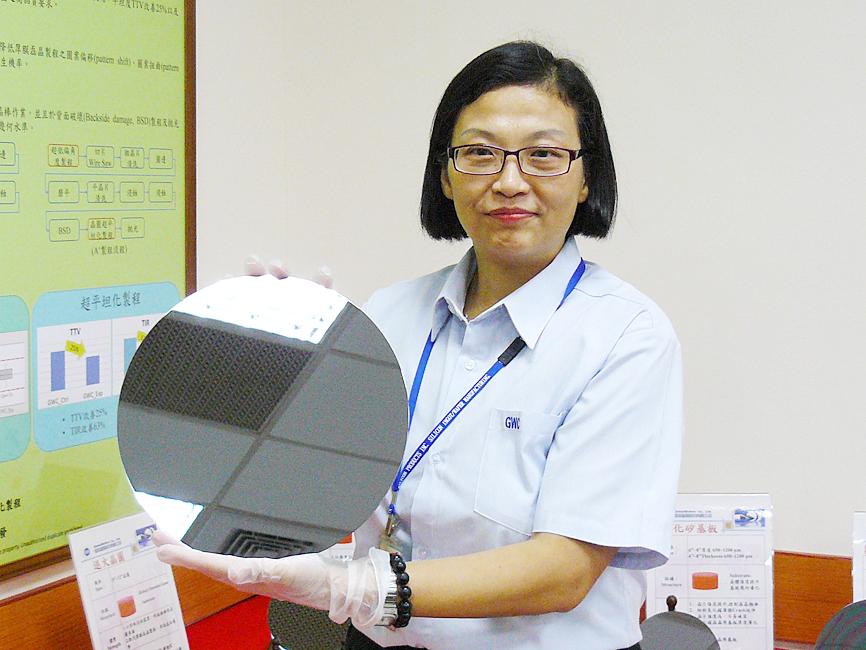GlobalWafers Inc (環球晶圓) yesterday said it is in final talks to acquire Germany-based Siltronic AG in a 3.75 billion euro (US$4.5 billion) deal, which might help it compete with its closest rival Sumco Corp of Japan.
The acquisition would be the fifth for GlobalWafers since 2008, as it has grown to become the world’s No. 3 supplier of silicon wafers through such deals.
GlobalWafers, which has a 17 percent market share, would see its market position greatly elevated to 30 percent when combined with Siltronic’s 13 percent, according to a presentation Siltronic gave to its investors at a quarterly conference in August.

Photo: CNA
Sumco has a 25 percent share, tracking behind the world’s top supplier of silicon wafers Shin-Etsu Chemical Co’s 33 percent, Munich-based Siltronic has said.
The deal would add five fabs to GlobalWafers. Siltronic, the world’s No. 4 silicon wafer supplier, operates two 12-inch fabs in Germany and one in Singapore, as well as two 8-inch fabs, one in Singapore and the other in the US, according to its Web site.
GlobalWafers has said its short-term goal is to expand its market share in the 12-inch and 8-inch silicon wafer areas.
The announcement boosted the share price of GlobalWafers by 9.84 percent to NT$558 on the Taipei Exchange yesterday.
Siltronic and GlobalWafers are working toward a formal announcement of the signing of a business combination agreement in the second week of this month, following discussions and approval by the supervisory board of Siltronic and the board of GlobalWafers.
The two companies are “near final discussions to enter into a business combination agreement, pursuant to which GlobalWafers would launch a voluntary tender offer to Siltronic shareholders with an offer price of 125 euros per share,” GlobalWafers said in a statement.
In addition, the executive board of Siltronic intends to propose a dividend in line with the company’s dividend policy of about 2 euros per share for the fiscal year 2020, which is expected to be paid prior to the completion of the transaction, the statement said.
Siltronic would pursue an essentially unchanged business strategy, the social partnership with its employee representatives would be maintained, and there would be no site closures or layoffs for operational reasons in Germany until the end of 2024, GlobalWafers said.
GlobalWafers on Nov. 10 gave a positive outlook for next year and forecast that demand to be close to the levels in 2018, which was the best year for the industry.
Almost all of its fabs are fully utilized or near 100 percent capacity, and the company expects better demand visibility for this quarter and next quarter, it said at the time.
As of the end of last quarter, the Hsinchu-based company had about US$1.1 billion in cash or cash equivalents.

In Italy’s storied gold-making hubs, jewelers are reworking their designs to trim gold content as they race to blunt the effect of record prices and appeal to shoppers watching their budgets. Gold prices hit a record high on Thursday, surging near US$5,600 an ounce, more than double a year ago as geopolitical concerns and jitters over trade pushed investors toward the safe-haven asset. The rally is putting undue pressure on small artisans as they face mounting demands from customers, including international brands, to produce cheaper items, from signature pieces to wedding rings, according to interviews with four independent jewelers in Italy’s main

Japanese Prime Minister Sanae Takaichi has talked up the benefits of a weaker yen in a campaign speech, adopting a tone at odds with her finance ministry, which has refused to rule out any options to counter excessive foreign exchange volatility. Takaichi later softened her stance, saying she did not have a preference for the yen’s direction. “People say the weak yen is bad right now, but for export industries, it’s a major opportunity,” Takaichi said on Saturday at a rally for Liberal Democratic Party candidate Daishiro Yamagiwa in Kanagawa Prefecture ahead of a snap election on Sunday. “Whether it’s selling food or

CONCERNS: Tech companies investing in AI businesses that purchase their products have raised questions among investors that they are artificially propping up demand Nvidia Corp chief executive officer Jensen Huang (黃仁勳) on Saturday said that the company would be participating in OpenAI’s latest funding round, describing it as potentially “the largest investment we’ve ever made.” “We will invest a great deal of money,” Huang told reporters while visiting Taipei. “I believe in OpenAI. The work that they do is incredible. They’re one of the most consequential companies of our time.” Huang did not say exactly how much Nvidia might contribute, but described the investment as “huge.” “Let Sam announce how much he’s going to raise — it’s for him to decide,” Huang said, referring to OpenAI

The global server market is expected to grow 12.8 percent annually this year, with artificial intelligence (AI) servers projected to account for 16.5 percent, driven by continued investment in AI infrastructure by major cloud service providers (CSPs), market researcher TrendForce Corp (集邦科技) said yesterday. Global AI server shipments this year are expected to increase 28 percent year-on-year to more than 2.7 million units, driven by sustained demand from CSPs and government sovereign cloud projects, TrendForce analyst Frank Kung (龔明德) told the Taipei Times. Demand for GPU-based AI servers, including Nvidia Corp’s GB and Vera Rubin rack systems, is expected to remain high,